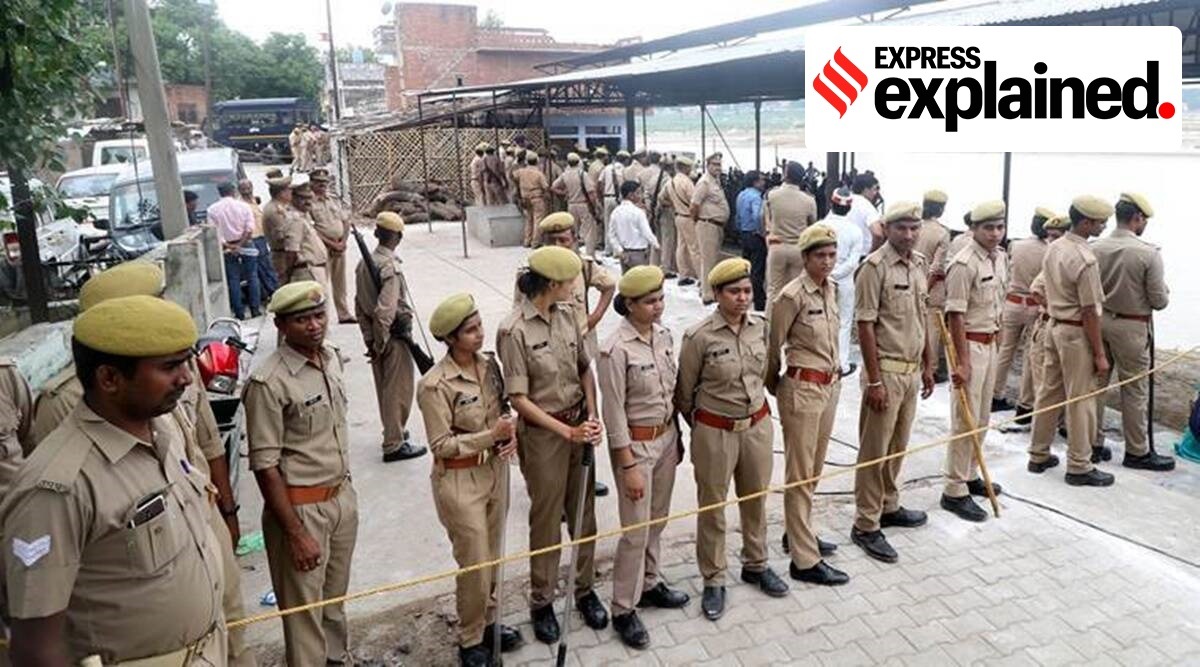Explained: How commissionerate system in Bhopal and Indore will impact policing
Prime Minister Modi, during the 56th DGPs and IGPs conference, is said to have reinforced the need to adopt the commissionerate system in cities with a population of over 10 lakh.
 Under the police commissionerate system, the powers of both policing and magistracy are concentrated with the commissioner, who is directly accountable to the state government and the state police chief. (Representative image)
Under the police commissionerate system, the powers of both policing and magistracy are concentrated with the commissioner, who is directly accountable to the state government and the state police chief. (Representative image)Citing growing population and geographical expansion of Bhopal and Indore and the accompanying administrative and law & order problems, Madhya Pradesh Chief Minister Shivraj Singh Chouhan on November 21 announced the implementation of a police commissionerate system in the two cities.
Here is a look at the commissionerate system and how it will impact policing in the two cities:
What is the ‘dual command’ system of policing that is in force across Madhya Pradesh?
Under the dual command system, the District Magistrate and the Superintendent of Police (SP) share powers and responsibilities in a district. Under this structure, the DM is entrusted with issuing arrest warrants, licenses while the SP has powers and responsibilities to investigate crime and make arrests. The system is designed to ensure a lower concentration of power and making the police more accountable to the DM at the district level. Under the police commissionerate system, the powers of both policing and magistracy are concentrated with the commissioner, who is directly accountable to the state government and the state police chief.
How does the commissionerate system empower the police?
The commissioner of police under the commissionerate system exercises the powers and duties of a District Magistrate. These powers are also available to any officer under the commissioner who is not below the rank of an Assistant Commissioner of Police.
This essentially means that such police officers now have powers of preventive arrest, imposing Section 144 of the CrPC Act and also to initiate chapter proceedings which include issuing showcause notices to persons asking them to execute a bond with or without sureties for good behaviour in interest of the public. The police are also empowered to conduct externment proceedings and issue written orders to remove a person from their jurisdiction of the commissionerate for a maximum of two years.
Why does Madhya Pradesh intend to introduce the commissionerate system in Bhopal and Indore?
Various committees constituted to suggest police reforms have recommended implementation of a police commissioner system in cities which have witnessed rapid urbanisation and have a population of more than 10 lakhs. In the 6th report of the National Police Commission, it noted that as compared to police in districts, police in commissionerate in small areas had a better account of themselves. It further pointed out that in urban areas, the changing dynamism and growing complexities of security threats required a swift and prompt response leaving very little time for discussion and debate, while recommending that the commissionerate system can be started in urban areas with a population of 10 lakh and above.
 Prime Minister Narendra Modi, while interacting with police probationers at the Sardar Vallabhbhai Patel National Police Academy earlier this year, also stated that efforts are being taken to implement the police commissionerate system in cities with a population of more than 10 lakh. The commissionerate system is already enforced in various cities in 16 states of the country.
Prime Minister Narendra Modi, while interacting with police probationers at the Sardar Vallabhbhai Patel National Police Academy earlier this year, also stated that efforts are being taken to implement the police commissionerate system in cities with a population of more than 10 lakh. The commissionerate system is already enforced in various cities in 16 states of the country.
Indore is the most populated city of MP with a population of 32.72 lakh while the state’s capital Bhopal is the fifth most populated district with a population of 23.68 lakh as per the census of 2011. A senior police officer pointed out that usually in large urban areas, law and order situations develop rapidly, requiring a speed and effective operational response from the police. However, in districts where the SPs and DMs do not have an understanding, orders to swiftly act are rarely issued in time which aggravate the situation.
A senior police officer from Bhopal explained, “We routinely issue showcause notices and subsequently surety bonds to habitual offenders ahead of festival season but its compliance through the DM is hardly ensured as for them it’s another administrative job.”
Indore recorded 13,406 IPC offences in 2020 as against 23,465 offences in 2015 and 18,473 offences in 2010. Whereas, Bhopal recorded 14,040 IPC offences in 2010 which increased to 16,564 offences in 2015 and touched 21330 IPC offences registered in 2020.
Why is it being done now? Has it been tried before?
The decision to implement the commissionerate system in Bhopal and Indore was announced by the Chief Minister at the 56th DGPs and IGPs conference. The Prime Minister, during the meeting, is said to have reinforced the need to adopt the commissionerate system in cities with a population of over 10 lakh. But this is not the first time that the state has deliberated on implementing this form of policing system.
The state has earlier tried to implement the system. Shivraj Singh had announced the adoption of a commissionerate system in Bhopal and Indore in April 2012 but instead ended up introducing the post of Senior Superintendent of Police (SSP) in these two cities. Subsequently, in 2011, the SSP system in Indore and Bhopal was replaced with DIG system, dividing the cities into two districts, each headed by an SP with a DIG above them. In April 2018, he again announced the introduction of a commissionerate system in Bhopal and Indore considering the law and order situation ahead of Assembly polls, but it could not happen, owing to strong opposition from the IAS lobby. Subsequently, when the Congress came to power in 2018, Chief Minister Kamal Nath also hinted at introducing the commissionerate system in February 2019. However his government lost power the following year.
Why is it being met with opposition?
In a letter to the Chief Minister, Madhya Pradesh Rajasva Adhikar Sangh, a representative union of all nearly 1,500 tahsildars and nayab tahsildars in the state, have urged the CM to ensure discussion and deliberation upon the decision with ministers, public representatives, council of lawyers. Speaking to the Indian Express, Narendra Singh Thakur, president of the Sangh, said, “There was no deliberation or discussion before the decision was announced. There needs to be some clarity on what powers will be taken away from the revenue officers, collectors, SDMs and how it will impact the society before implementing it.”
Newsletter | Click to get the day’s best explainers in your inbox
How soon will this system be enforced?
Senior officers from the state government pointed out that the commissionerate system might get enforced in both Bhopal and Indore by the end of December 2021.
- 01
- 02
- 03
- 04
- 05






































